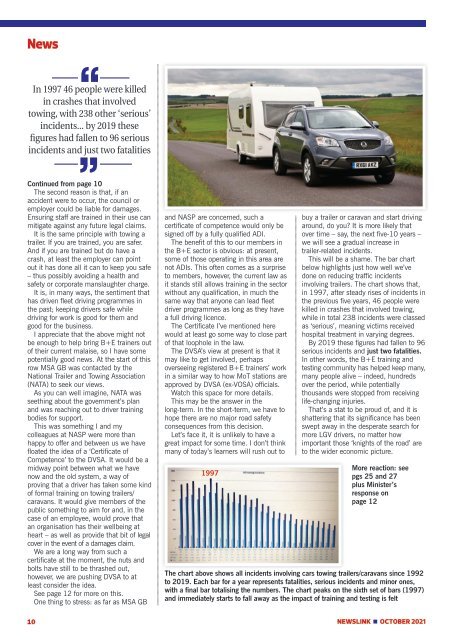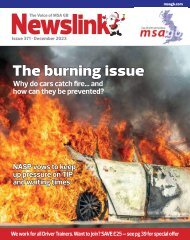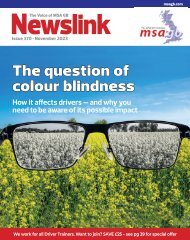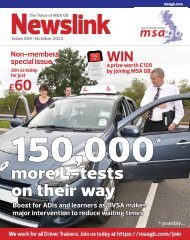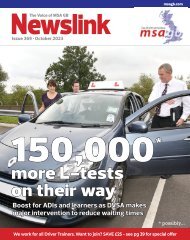Newslink October 2021
Membership magazine of the Motor Schools Association; road safety, driver training and testing news.
Membership magazine of the Motor Schools Association; road safety, driver training and testing news.
Create successful ePaper yourself
Turn your PDF publications into a flip-book with our unique Google optimized e-Paper software.
News<br />
‘‘<br />
In 1997 46 people were killed<br />
in crashes that involved<br />
towing, with 238 other ‘serious’<br />
incidents... by 2019 these<br />
figures had fallen to 96 serious<br />
incidents and just two fatalities<br />
Continued from page 10<br />
The second reason is that, if an<br />
accident were to occur, the council or<br />
employer could be liable for damages.<br />
Ensuring staff are trained in their use can<br />
mitigate against any future legal claims.<br />
It is the same principle with towing a<br />
trailer. If you are trained, you are safer.<br />
And if you are trained but do have a<br />
crash, at least the employer can point<br />
out it has done all it can to keep you safe<br />
– thus possibly avoiding a health and<br />
safety or corporate manslaughter charge.<br />
It is, in many ways, the sentiment that<br />
has driven fleet driving programmes in<br />
the past; keeping drivers safe while<br />
driving for work is good for them and<br />
good for the business.<br />
I appreciate that the above might not<br />
be enough to help bring B+E trainers out<br />
of their current malaise, so I have some<br />
potentially good news. At the start of this<br />
row MSA GB was contacted by the<br />
National Trailer and Towing Association<br />
(NATA) to seek our views.<br />
As you can well imagine, NATA was<br />
seething about the government’s plan<br />
and was reaching out to driver training<br />
bodies for support.<br />
This was something I and my<br />
colleagues at NASP were more than<br />
happy to offer and between us we have<br />
floated the idea of a ‘Certificate of<br />
Competence’ to the DVSA. It would be a<br />
midway point between what we have<br />
now and the old system, a way of<br />
proving that a driver has taken some kind<br />
of formal training on towing trailers/<br />
caravans. It would give members of the<br />
public something to aim for and, in the<br />
case of an employee, would prove that<br />
an organisation has their wellbeing at<br />
heart – as well as provide that bit of legal<br />
cover in the event of a damages claim.<br />
We are a long way from such a<br />
certificate at the moment, the nuts and<br />
bolts have still to be thrashed out,<br />
however, we are pushing DVSA to at<br />
least consider the idea.<br />
See page 12 for more on this.<br />
One thing to stress: as far as MSA GB<br />
10<br />
‘‘<br />
and NASP are concerned, such a<br />
certificate of competence would only be<br />
signed off by a fully qualified ADI.<br />
The benefit of this to our members in<br />
the B+E sector is obvious: at present,<br />
some of those operating in this area are<br />
not ADIs. This often comes as a surprise<br />
to members, however, the current law as<br />
it stands still allows training in the sector<br />
without any qualification, in much the<br />
same way that anyone can lead fleet<br />
driver programmes as long as they have<br />
a full driving licence.<br />
The Certificate I’ve mentioned here<br />
would at least go some way to close part<br />
of that loophole in the law.<br />
The DVSA’s view at present is that it<br />
may like to get involved, perhaps<br />
overseeing registered B+E trainers’ work<br />
in a similar way to how MoT stations are<br />
approved by DVSA (ex-VOSA) officials.<br />
Watch this space for more details.<br />
This may be the answer in the<br />
long-term. In the short-term, we have to<br />
hope there are no major road safety<br />
consequences from this decision.<br />
Let’s face it, it is unlikely to have a<br />
great impact for some time. I don’t think<br />
many of today’s learners will rush out to<br />
1997<br />
buy a trailer or caravan and start driving<br />
around, do you? It is more likely that<br />
over time – say, the next five-10 years –<br />
we will see a gradual increase in<br />
trailer-related incidents.<br />
This will be a shame. The bar chart<br />
below highlights just how well we’ve<br />
done on reducing traffic incidents<br />
involving trailers. The chart shows that,<br />
in 1997, after steady rises of incidents in<br />
the previous five years, 46 people were<br />
killed in crashes that involved towing,<br />
while in total 238 incidents were classed<br />
as ‘serious’, meaning victims received<br />
hospital treatment in varying degrees.<br />
By 2019 these figures had fallen to 96<br />
serious incidents and just two fatalities.<br />
In other words, the B+E training and<br />
testing community has helped keep many,<br />
many people alive – indeed, hundreds<br />
over the period, while potentially<br />
thousands were stopped from receiving<br />
life-changing injuries.<br />
That’s a stat to be proud of, and it is<br />
shattering that its significance has been<br />
swept away in the desperate search for<br />
more LGV drivers, no matter how<br />
important those ‘knights of the road’ are<br />
to the wider economic picture.<br />
More reaction: see<br />
pgs 25 and 27<br />
plus Minister’s<br />
response on<br />
page 12<br />
The chart above shows all incidents involving cars towing trailers/caravans since 1992<br />
to 2019. Each bar for a year represents fatalities, serious incidents and minor ones,<br />
with a final bar totalising the numbers. The chart peaks on the sixth set of bars (1997)<br />
and immediately starts to fall away as the impact of training and testing is felt<br />
NEWSLINK n OCTOBER <strong>2021</strong>


